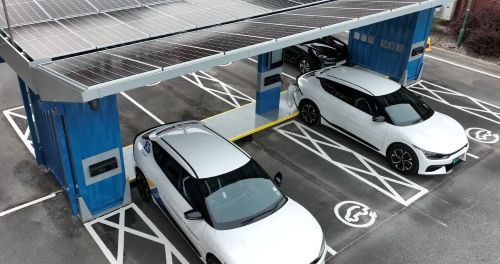


Mobile EV Charging: Powering the Future of Electric Mobility On-the-Go
As one of leading EV charger manufacturers in China, LiCB Charge delivers dependable AC and DC electric vehicle charging stations along with comprehensive charging solutions.
As electric vehicles (EVs) gain popularity worldwide, the demand for accessible and convenient charging solutions is growing rapidly. One innovative approach reshaping the EV charging landscape is mobile EV charging. Unlike traditional fixed charging stations, mobile chargers provide on-the-go power, offering unprecedented flexibility and convenience for EV owners.
This article explores what mobile EV charging is, its advantages, market opportunities, challenges, and its potential to revolutionize how we power electric vehicles.
Mobile EV charging—also called portable, on-demand, or roving charging—is a dynamic charging solution that delivers electricity to EVs without the need for permanent infrastructure. These chargers are transportable and can move between locations or even come directly to vehicles needing a charge.
Unlike stationary chargers fixed in one place, mobile units operate through portable power sources such as:
Battery-powered charging units — large-scale mobile battery packs that can deliver DC fast charging.
Generator-equipped vans or trailers — capable of rapid on-site charging.
Temporary pop-up charging stations — deployed at events, parking lots, or remote areas where infrastructure is limited.
This mobility allows rapid deployment to areas of high EV traffic, roadside emergencies, or locations where installing permanent chargers is impractical or cost-prohibitive.
Mobile charging overcomes one of the biggest EV adoption barriers: limited infrastructure, especially in rural or underserved areas. It brings power directly to the driver, providing emergency charging and serving locations where permanent stations don’t yet exist.
Mobile units can quickly set up at events, fleet operations, construction sites, or temporary workplaces. Businesses can start small and scale easily by adding more mobile units—without the costly construction and permitting involved in fixed stations.
By offering roadside assistance and expanding charging access in sparse regions, mobile charging alleviates drivers’ fear of running out of power, increasing confidence in electric vehicles.
For companies, mobile charging requires lower upfront investment than permanent stations and avoids real estate and infrastructure costs, enabling flexible, revenue-generating services with minimal commitment.
With EV adoption soaring, drivers need charging alternatives beyond fixed stations, particularly in urban areas with limited access, rural regions, and commercial fleets needing on-site power.
Mobile charging fits well in areas like event venues, roadside assistance, and fleet management, creating unique business opportunities.
Mobile charging solutions powered by renewable energy sources (solar, wind, battery storage) support global efforts to decarbonize transportation.
Starting a mobile charging business involves purchasing vehicles or trailers, investing in high-capacity batteries or generators, and covering maintenance and operational costs.
Operating mobile power solutions requires navigating varying regional regulations on energy distribution, safety standards, and permits.
With fixed charging infrastructure expanding rapidly, mobile providers must differentiate by targeting underserved or niche markets.
Current mobile battery capacity limits may require frequent recharging of the units themselves. Advances in battery and fast-charging technologies are crucial for future scalability.
Emerging trends suggest mobile charging will become a vital part of the EV ecosystem:
AI-Powered Networks: Smart dispatch systems that send mobile chargers based on real-time demand.
Vehicle-to-Grid (V2G) Integration: Leveraging EVs as mobile power sources during emergencies or peak demand.
Renewable-Powered Units: Solar, hydrogen, or other zero-emission charging solutions enhancing sustainability.
Mobile EV charging is a game-changing innovation offering unmatched flexibility, scalability, and convenience. Despite challenges such as startup costs and regulatory hurdles, the rapidly growing demand for accessible charging ensures a bright future.
As infrastructure evolves, mobile charging will play an essential role in eliminating range anxiety and accelerating the shift to sustainable transportation worldwide.
For businesses and entrepreneurs, now is the time to explore opportunities in this promising market—before mobile EV charging becomes the new standard for powering electric vehicles.Know more about Google SEO Directory
